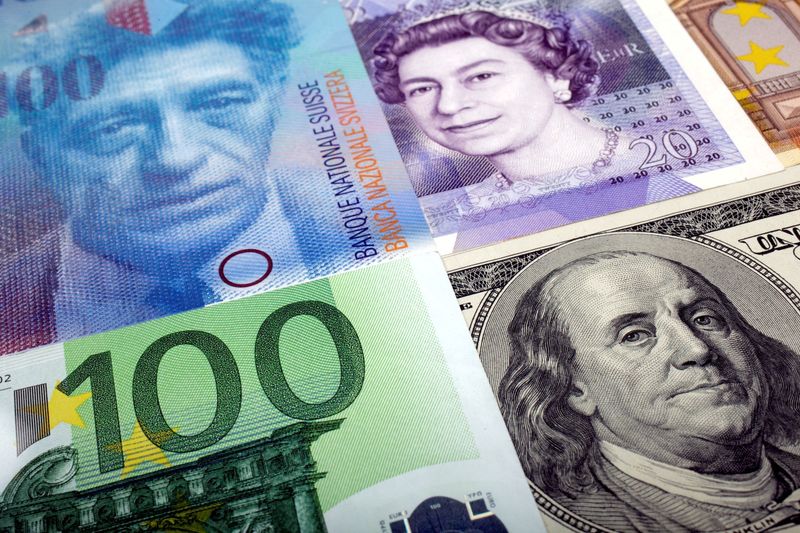 © Reuters. FILE PHOTO: A picture illustration of U.S. dollar, Swiss Franc, British pound and Euro bank notes, taken in Warsaw January 26, 2011. REUTERS/Kacper Pempel
© Reuters. FILE PHOTO: A picture illustration of U.S. dollar, Swiss Franc, British pound and Euro bank notes, taken in Warsaw January 26, 2011. REUTERS/Kacper Pempel
By Alun John
HONG KONG (Reuters) - Currency markets started the week nervously eying tensions in eastern Europe, with the safe-haven yen not far from a two-week high while the euro was on edge given the energy security and economic implications for Europe of a war in Ukraine.
"Russia-Ukraine tensions are starting to dominate risk sentiment and price action. The market is likely to keep chasing headlines without any clarity on the eventual outcome," said analysts at Barclays (LON:BARC) in a note.
Illustrating this, the euro took a small lift early in the Asian session after the office of French President Emmanuel Macron said U.S. President Joe Biden and Russian President Vladimir Putin have agreed in principle to hold a summit on the Ukraine crisis, though it added such a meeting would be impossible if Russia invaded Ukraine.
In turn, the yen lost a modicum of ground on the dollar following the announcement, which comes after a week of heightened tensions spurred by Russia's military build-up on Ukraine's borders.
The euro was 0.12% higher at $1.13340 while the yen was at 115.05 per dollar, pausing its earlier drift towards its two-week low of 114.78 touched Friday.
Safe havens like the yen and Swiss franc have been the major beneficiaries of the geopolitical tension in eastern Europe.
Earlier in the session the euro had been hurt and the yen boosted by Sunday's announcement from the Belarusian defence ministry that Russia would extend military drills in Belarus.
In broad terms, moves in currencies aligned with moves in risk sentiment across asset classes. U.S. share futures slipped in early trading on Monday, before turning positive after news of the possible summit. [MKTS/GLOB]
When not thinking about the situation in eastern Europe, currency markets are also still concentrating on central bank policy, with divergences in the speed and size of different markets' interest rate hikes a major factor.
As a result, markets will be closely watching a string of public remarks from U.S. Federal Reserve policy makers this week for any hint that a large 50 basis point rate hike could come at the Fed's March meeting instead of the more widely expected 25 basis point increase.
The pound was drifting somewhat at $1.36000 in the middle of its recent range, given some support by expectations of another rate hike at the Bank of England's March meeting, though perhaps weighed by Ukraine tensions.
Public remarks are also due from several BOE policy makers as well.
Bitcoin recovered a little from a mild bruising over the weekend. The world's largest cryptocurrency was up 2% at around $39,000.
Early on Monday it touched a new two-week low of $38,210.

